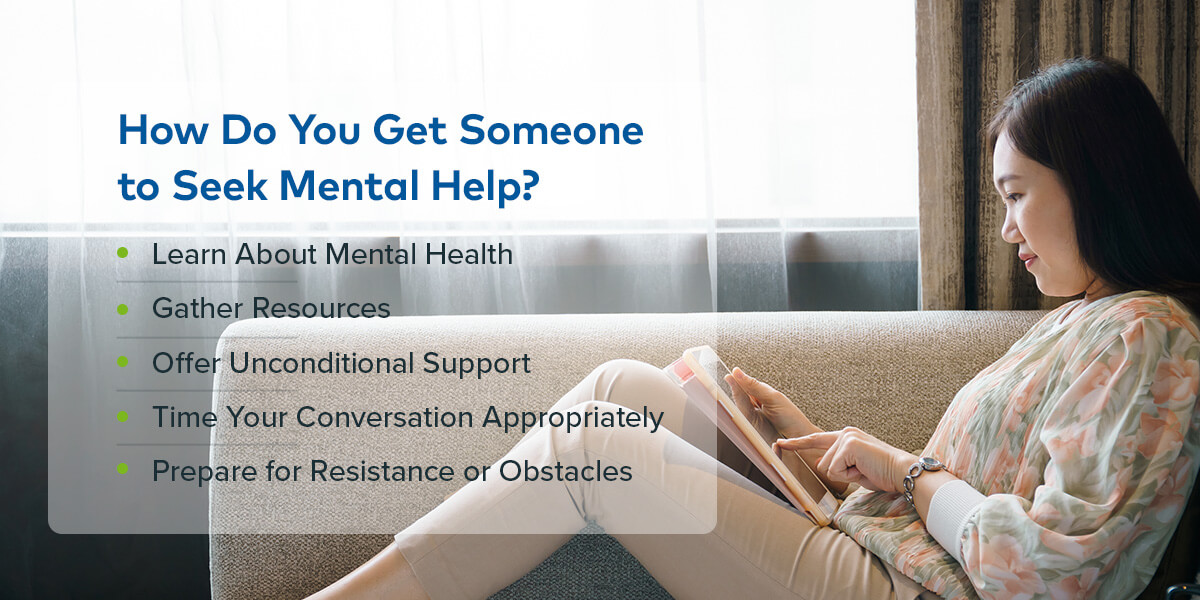How to Encourage a Loved One to Seek Mental Health Help
Knowing how to get someone to seek mental treatment can significantly impact their life. Friends and family members are often excellent support systems for individuals experiencing mental health conditions. If you’re wondering how to get a loved one to seek mental health treatment, some useful tips can help you encourage and empower them.
The Importance of Mental Health Treatment
In any given year, 1 in 5 adults in the United States experiences a mental health condition like depression or anxiety. Mental health conditions can affect an individual’s ability to maintain daily tasks, and it can lead to physical health complications.
Treatment can help people with mental illness lead full, productive lives, but not everyone has the support they need. Approximately 21.6% of people received treatment for a mental health condition in 2021, but more people can benefit from professional support.
Mental health treatment, such as therapy and medication, can provide the following benefits:
- Improved self-esteem and confidence
- Improved decision-making skills
- Increased self-awareness
- Emotional regulation skills development
- Better coping mechanisms and problem-solving abilities
- Greater interpersonal skills
- Improved communication skills
- Improved mood
- Decreased risk of developing some physical conditions
- Greater school or work performance
- Higher quality of life
Why People Do Not Seek Help
Sometimes a lack of insight or self-awareness stops people from seeking professional help, as they simply don’t know, don’t believe or are not ready to acknowledge the problem. Others may hold a sense of self-reliance that makes them feel shame, guilt or fear about being vulnerable enough to ask for help.
The phrase “get help” can itself be stigmatizing and disempowering for someone experiencing a challenge related to mental health. Instead, encourage your loved one to pursue “treatment” or “support.”
You should also consider that maybe your loved one actively wants to participate in treatment or seek professional support, but certain factors make it difficult or even impossible. Mental health care is not always accessible, whether due to barriers caused by distance, finances or language.
Others might have been discouraged from seeking treatment in the past or experienced medical trauma that could cause fear or distrust in the medical system as a whole.
How Do You Get Someone to Seek Mental Help?

Friends, family members and partners can be excellent support systems for individuals experiencing mental health conditions. Watching someone you care about experience symptoms of a mental health condition can be hard, but you can encourage them to seek treatment if they aren’t able or willing to do so on their own.
Encouraging someone to pursue treatment is not always easy, but approaching your friend or family member with respect and support may open their mind to options.
Consider the following tips if you’re trying to get someone to seek professional support for their mental health:
1. Learn About Mental Health
Understanding mental health conditions and the importance of treatment can help you better support your loved one and their challenges. You can help them recognize signs and symptoms they may be experiencing and provide resources that demonstrate how treatment could help them and improve their quality of life.
You can also help them separate misinformation from facts if they hold any misconceptions about mental health conditions and treatment. Education is an essential part of dispelling any fears or hesitancy surrounding medical care.
2. Gather Resources
Another way you can support your friend or family member is by gathering helpful resources. Some people don’t seek help because they are unaware of available treatments. Locate mental health services in your area and explain different types of available treatments so your loved one knows they have options. A mental health professional can help your friend or family member choose the treatment that’s best for them, but learning about options is an excellent start.
You can also help your friend or family member find a provider that accepts their insurance to help ease the process for them. Your loved one may feel overwhelmed about finding a provider, so you can offer to make any calls for them and accompany them to their first appointment if it would make them feel more comfortable.
3. Offer Unconditional Support
Because there’s still such an intense stigma surrounding mental health and treatment in today’s society, it’s vital to offer unconditional support so your loved one knows you truly care about their well-being.
To make sure they can feel your unconditional support, approach them with empathy rather than judgment. The one you care about may already know they need help, but they may be afraid to seek it if they think others will judge them. Avoid patronizing language and offensive terms, and stay away from harmful labels or stereotypes. Instead, choose empowering words and be attentive to their opinions and concerns.
To show them how much you care, be gentle, and use “I” statements whenever possible. You might say, “I feel concerned for you when I see you like this. I’m hopeful we can come up with a way to help you.”
4. Time Your Conversation Appropriately
Before you even think about how you’ll approach the subject of mental health care with your friend or family member, it’s important to determine when and where it’d be best for the two of you to have this kind of conversation.
How your loved one reacts to your suggestions and guidance can be, to a great extent, determined by your timing. You don’t want to start the conversation when they’re in a bad mood, tired, under a lot of stress, in the middle of something important, or otherwise distracted, as they’ll be more likely to dismiss you or shrug off your advice.
You also don’t want to have this sensitive conversation in front of other people, or in a situation where others can easily overhear what’s being said. Instead, approach your loved one when they’re calm and in a good mood, and aim to have a private, friendly conversation that leaves them feeling cared for and respected.
5. Prepare for Resistance or Obstacles
Before you head into your conversation, think about what you might say if your loved one resists your insights and suggestions. If they say they’re not willing or ready to receive help, don’t consider it a closed door. As long as the subject is on the table, you still have an opportunity to help them understand their situation as well as the importance of treatment.
To help them see themselves the same way you do, you may start by naming their positive characteristics, including those that are less apparent when their symptoms take over. When you celebrate someone’s admirable qualities, they’re more likely to be motivated to get the help they need to better themselves even further.
Be ready to help your loved one work through any obstacles that could stand in the way of pursuing treatment, such as limited mobility, lack of transportation or scheduling conflicts with family or work. Show them they are surrounded by genuine support and are not alone.
Help Your Loved One Seek Treatment With Advanced Psychiatry Associates
Encouraging someone to seek professional mental health treatment can significantly benefit their life. Whether your loved one is ready or resistant, the experienced therapists at Advanced Psychiatry Associates can help. Our skilled psychiatrists offer various treatment options to help individuals manage their mental health. Contact us to learn more or schedule an appointment for you or a loved one.







